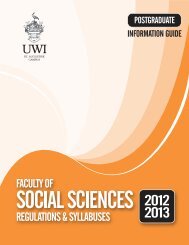Faculty of Humanities and Education (Postgraduate) - The University ...
Faculty of Humanities and Education (Postgraduate) - The University ...
Faculty of Humanities and Education (Postgraduate) - The University ...
Create successful ePaper yourself
Turn your PDF publications into a flip-book with our unique Google optimized e-Paper software.
POSTGRADUATE REGULATIONS & SYLLABUSES 2012 - 2013<br />
THE FACULTY OF HUMANITIES & EDUCATION<br />
COURSE DESCRIPTIONS<br />
MEd - Concentration in Youth Guidance &<br />
MEd - Concentration in Curriculum<br />
YEAR:<br />
SEMESTER:<br />
COURSE CODE: EDFA 6207<br />
COURSE TITLE: EDUCATION AND THE DEVELOPMENT OF<br />
SOCIAL COMPETENCIES<br />
NUMBER OF CREDITS: 4<br />
COURSE DESCRIPTION: This course will employ a problembased<br />
approach to introduce participants to some <strong>of</strong> the<br />
critical dilemmas, conflicts, <strong>and</strong> prominent controversies<br />
arising from social development. It therefore takes into<br />
consideration the dilemmas that <strong>of</strong>ten arise in the nature <strong>of</strong> the<br />
relationship between education <strong>and</strong> the promotion <strong>of</strong> equity,<br />
the enhancement <strong>of</strong> productivity <strong>and</strong> competitiveness, the<br />
empowerment <strong>of</strong> agents <strong>and</strong> actors in the education system,<br />
<strong>and</strong> the development <strong>of</strong> sustainable models <strong>of</strong> socio-economic<br />
<strong>and</strong> political development. It seeks to help students to identify,<br />
characterize, <strong>and</strong> analyze some <strong>of</strong> these major dilemmas in<br />
contemporary social life as they would impact on educational<br />
issues. It would contribute to the development <strong>of</strong> theoretical<br />
insights that can guide actors <strong>and</strong> agencies in education<br />
towards the formulation <strong>of</strong> practical solutions.<br />
OBJECTIVES<br />
<strong>The</strong> student will be able to:<br />
1. identify <strong>and</strong> examine some <strong>of</strong> the major dilemmas in<br />
contemporary social life that impact on educational<br />
practice;<br />
2. apply key principles, concepts, <strong>and</strong> theories from the<br />
philosophy, sociology, <strong>and</strong> psychology <strong>of</strong> education to the<br />
analysis <strong>of</strong> these major dilemmas;<br />
3. adduce <strong>and</strong> address the implications for education<br />
emanating from the analysis <strong>of</strong> these dilemmas.<br />
CONTENT<br />
• Philosophy: Cultural Diversity – Schooling <strong>and</strong> the issue <strong>of</strong><br />
citizenship in a multicultural/plural society<br />
• rights <strong>and</strong> duties <strong>of</strong> citizens in a diverse society<br />
• democracy, problems <strong>of</strong> toleration <strong>and</strong> recognition<br />
• teaching, citizenship <strong>and</strong> the justification <strong>of</strong><br />
schooling<br />
• Sociology: Culture, Postmodernism, <strong>and</strong> <strong>Education</strong><br />
• globalisation<strong>and</strong>nativism:thechallengeforeducation<br />
(a new learning culture)<br />
• reducing prejudice in the postmodern world: the<br />
sociology <strong>of</strong> modern mass media, information <strong>and</strong><br />
communication technologies<br />
• social construction <strong>and</strong> postmodernism<br />
• education <strong>and</strong> a culture <strong>of</strong> peace<br />
• Psychology: <strong>Education</strong>, Culture, <strong>and</strong> the Individual<br />
• frames <strong>of</strong> mind: the psychological bases <strong>of</strong> the<br />
traditional vs. the reformed curriculum<br />
• new departures in learning <strong>and</strong> instruction:<br />
implications for the design <strong>of</strong> effective instruction, e.g.<br />
,constructivism<br />
• psychological perspectives on authentic <strong>and</strong> self<br />
assessment<br />
ASSESSMENT<br />
This course will be assessed through coursework (40%)<br />
<strong>and</strong> a final written examination (60%).<br />
REFERENCES<br />
(Philosophy)<br />
Crick, B. (2000). Essays on citizenship. London: Continuum.<br />
Delanty, G. (2000). Citizenship in a global age. Buckingham, UK:<br />
OUP.<br />
Fullinwider, R. (Ed.). (1996). Public education in a multicultural<br />
society. Cambridge, UK: CUP.<br />
Habermas, J. (1985). <strong>The</strong> philosophical discourse <strong>of</strong> modernity.<br />
Cambridge, UK: Polity.<br />
Krausz, M. (Ed.). (1989). Relativism. Notre Dame, IN: Notre Dame<br />
<strong>University</strong> Press.<br />
Rawls, J. (1993). Political liberalism. New York: Columbia <strong>University</strong><br />
Press.<br />
Stapleton, J. (Ed.). (1995). Group rights. Bristol, UK: Thoemmes.<br />
Tamir, Y. (Ed.). (1995). Democratic education in a multicultural<br />
state. Oxford: Blackwell.<br />
Waldron, J. (Ed.). (1984). <strong>The</strong>ories <strong>of</strong> rights. Oxford: OUP.<br />
Waldron, J. (1993). Liberal rights. Cambridge, UK: CUP.<br />
(Sociology)<br />
Apple, M., & Beane, J. (Eds.). (1995). Democratic schools.<br />
Alex<strong>and</strong>ria, VA: Association for Supervision <strong>and</strong> Curriculum<br />
Development.<br />
Barrow, C., & Reddock, R. (Eds.). (2001). Caribbean sociology:<br />
Introductory readings. Kingston, Jamaica: Ian R<strong>and</strong>le.<br />
Haq, M. ul (1999). Reflections on human development (exp<strong>and</strong>ed<br />
ed.). New York: OUP.<br />
Lewin, K. (1993). <strong>Education</strong> <strong>and</strong> development: <strong>The</strong> issues <strong>and</strong> the<br />
evidence. London: Overseas Development Administration<br />
Lyotard, J. (1992). Postmodernism explained. Minneapolis, MN:<br />
<strong>University</strong> <strong>of</strong> Minnesota Press.<br />
Taylor, S. (Ed.). (1999). Sociology: Issues <strong>and</strong> debates. London:<br />
Macmillan.<br />
Young, M. (1998). <strong>The</strong> curriculum <strong>of</strong> the future: From the ënew<br />
sociology <strong>of</strong> education’ to a critical theory <strong>of</strong> learning. London:<br />
Falmer.<br />
87

















